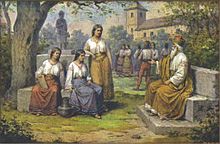Kazi
Kazi is a figure in Bohemian mythology . She is the eldest daughter of the second Bohemian ruler and judge Krok . Her sisters are Teta and Libuše . Each of the three sisters has a different talent: Libuše is a fortune teller, Teta introduces the cult of gods in the country and Kazi deals with medicine and sorcery.
Cosmas of Prague devotes a short paragraph to Kazi in his Chronica Boemorum, describing the country's fabulous oldest history. He compares her knowledge of medicinal herbs and magic spells with that of Medea and her healing arts with Asclepius . She saved many lives and her magical powers were so strong that even fate had to submit to her will. If something was irretrievably destroyed, the saying was used in Cosmas' time: "Even Kazi can no longer fix that." After her death, the local residents built a high burial mound in her honor on the bank of the Mže river .
According to the historian Dušan Třeštík, the mythical tale of the three sisters, which has only been handed down in fragmentary form and in Christian form, shows parallels to the Indo-European world of gods , since the Indo-European protective goddesses also often appear in threes and differ significantly in their responsibilities. The functions in the Christian reinterpretation of Cosmas correspond on the one hand to the characterization of superstition through idolatry ( idolatria ), fortune-telling ( divinatio ) and magic ( magia ), with Kazi representing magic. On the other hand, the sisters are mostly portrayed positively and thus correspond to the main Christian virtues personified: fides , faith , caritas , love and spes , hope .
literature
- Chronica Boemorum , I, 4, in the edition by Berthold Bretholz , Berlin 1923
- Dušan Třeštík : Mýty kmene Čechů . Nakladatelství lidové noviny, 2003, ISBN 80-7106-646-X .
